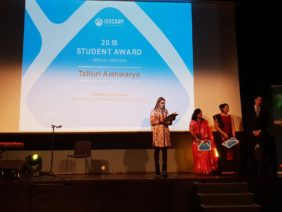 The Student Award (SA) addresses a bachelor and/or master student or student-group with outstanding results in a related field to urban and regional planning. As a form of ISOCARP’s recognition of the efforts by future planning professionals, the award is bestowed for final design projects, theses, studio projects, etc.
The Student Award (SA) addresses a bachelor and/or master student or student-group with outstanding results in a related field to urban and regional planning. As a form of ISOCARP’s recognition of the efforts by future planning professionals, the award is bestowed for final design projects, theses, studio projects, etc.
In 2018, six SA entries covering various aspects related to the broad field of spatial and urban planning were submitted:
- Climate Resilient Urban Development Strategies for a Mega City: A Case of NCT of Delhi, by Mahak Agrawal
- ‘Rurban’ landscapes: agroecology, a foundation for cool cities, by Talluri Aishwarya
- Barriers and opportunities in the implementation of Urban Green Infrastructure (UGI) across the Central Belt of Scotland, by Robbie Calvert
- Arctic Present: The Case of Teriberka, by Viktoriia Khokhlova
- Reinstating the child in the city: rethinking spatial systems as catalysts for a child’s physical, mental, social and spiritual development, by Aparajita Santra
- Phoenix Urban Heat Island and Transportation Planning, by Firas Suqi.
The jury composed of two young planners, one experienced ISOCARP member, an Executive Committee member and a Scientific Committee member, i.e. Lena Niel (the Netherlands) and Divya Chopra (India) as YPPs, Fernando Brandao Alves (Portugal), Zeynep Gunay, VP YPPs (Turkey) and Nasim Iranmanesh (Iran), the SC member, elected the following entries as the winners:
SA Winner:
Aparajita SANTRA, Reinstating the child in the city: rethinking spatial systems as catalysts for a child’s physical, mental, social and spiritual development
The project focuses on rethinking spatial systems as catalysts for a child’s physical, mental, social and spiritual development. Pointing out a clear imagery on the relation between goal and results, the project shows a new type of urban planning: literally planning from a people’s (child’s) perspective. By connecting both this perspective and all current challenges of spatial planning (e.g. climate-proofing cities, greening cities, flooding, etc.), the project addresses various planning relevant aspects and presents them in detail.
SA Special mention:
Talluri AISHWARYA, RURBAN landscapes: agroecology, a foundation for cool cities
In an urbanising world, as our cities continue to grow and expand, resulting in blurring the boundaries between urban and rural, this project responds to a significant issue within the Indian sub-continent where a large part of the population continues to reside in rural areas. The project articulates the challenges of peri-urban conditions and proposes a new way of looking at urban and rural interfaces. Through a systemic understanding, it connects the rural and the urban in a semiotic relationship. The project redefines the idea of ‘r-urban’ through a service economy-based approach, while continuing to strengthen urban-rural interdependencies. In addition, by focusing on retaining green belt in the form of productive landscapes, the project clearly shows how to translate current global urban challenges to spatial design on a local context.
We express our gratitude to all the applicants and look forward to numerous SA submissions in a year to come.